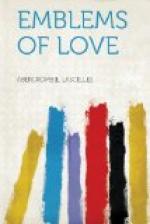IV
Into the darkness fared the outcast Queen;
Fearless her face, and searching with proud gaze
The impenetrable hour. Behind her burned
The sky, held by the open kiln of the town
In a great breath of fire, yellow and red,
From out the festival streets, and myriad links.
Still might she taste, and still must choke to taste,
The fragrance of sweet oils and gums aflame
Capturing the cool night with spicy riches;
Still after her through the hollow moveless air
The sounded ceremonies came, the cry
Of dainty lust in winding tune of fifes,
The silver fury of cymbals clamouring
Like frenzy in a woman-madden’d brain;
And drumming underneath the whole wild noise,
Like monstrous hatred underneath desire,
The thunder of the beaten serpent-skins.
Yea, in the town behind her, flaring Shushan,
She heard Man, meaning to adore himself,
Throned on the wealth of earth as God in heaven,
And making music of his glorying thought,
Merely betray the mastery of his blood,
His sexual heart, his main idolatry,—
Woman, and his lust to devour her beauty,
Himself devoured ceaselessly by her beauty.
And well she knew, to herself bitterly smiling,
How the King seated amid his fellow-kings
Devised his grievous rage, feeling himself
Insulted in his dearest mind, his rule
Over the precious pleasure of his women
Wounded: how the man’s wrath would hiss
and swell
Like gross spittle spat into red-hot coals.
But as the Queen fared through the blinded
hour,
Sudden against the darkness of her eyes
There came a wind of light. Crimson it was,
With smokey lightnings braided, in its first
Swift surge into the gloom before her face;
But it began to golden, and became
Astonishingly white. And as she stood
With rigour in her nerves, a mighty shudder
Ravish the light, and in the midst appeared
Vision, a goddess, terrible and kind;
And to the Queen the goddess spoke, in voice
That healed her anger with its quietness.
Ishtar. I am the goddess Ishtar, and thou art My servant. Wilt any of thou help me?
Vashti. Am I then one whom gods may help? I am By men judged hateful: surely I am thereby Made over to the demons, and not thine.
Ishtar. Yet art thou mine, because thou knowest well Thou disobeyest me.
Vashti.
How do I so?
Ishtar.
I am the goddess of the power of women,
And passion in the hearts of men is my
Divinity.
Vashti.
Yea, then I disobey
thee.
Ishtar. And yet thou shalt not fear me wronging thee: Tell me, O thou Despair, whither thou goest?
Vashti. Thy taunt goes past me; I am not despair.
Ishtar.
Verily, but thou art. Is not thy mind
A hot revolter from the service due
To my divinity, passion in men’s hearts?
Is there aught else that thou mayst serve? Thou
knowest
There is naught else: therefore thou art Despair.




